
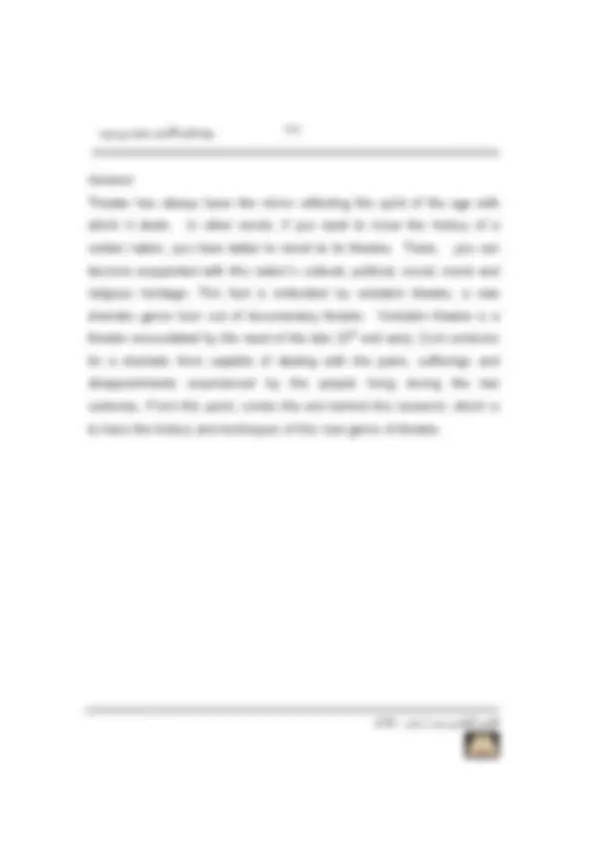
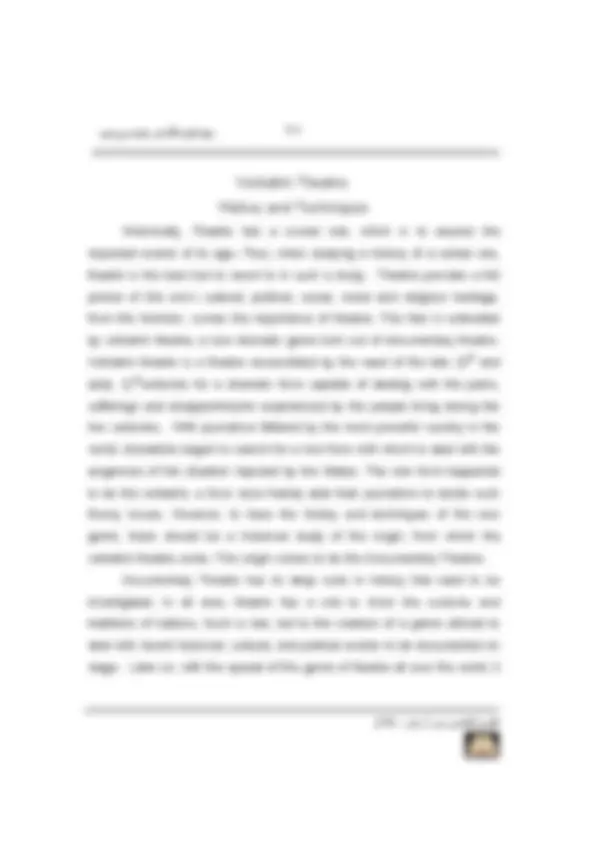
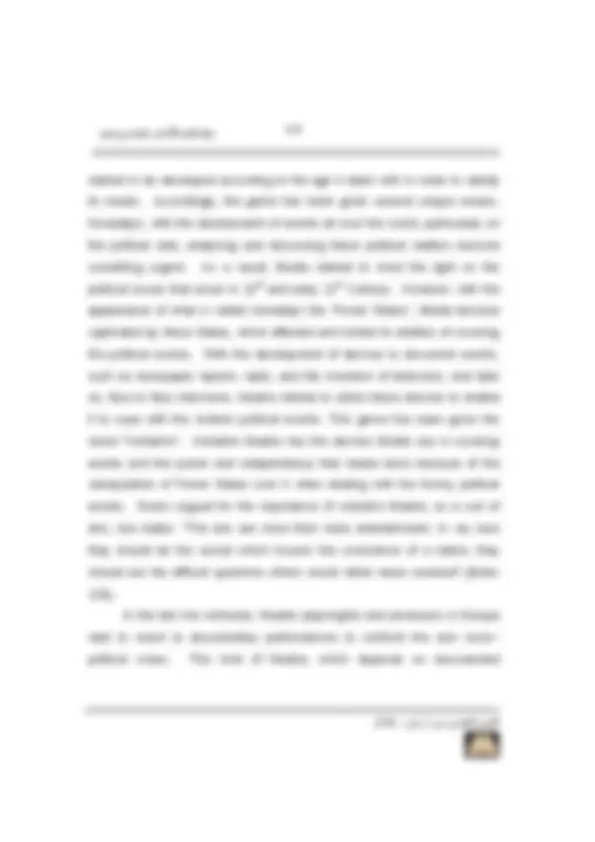
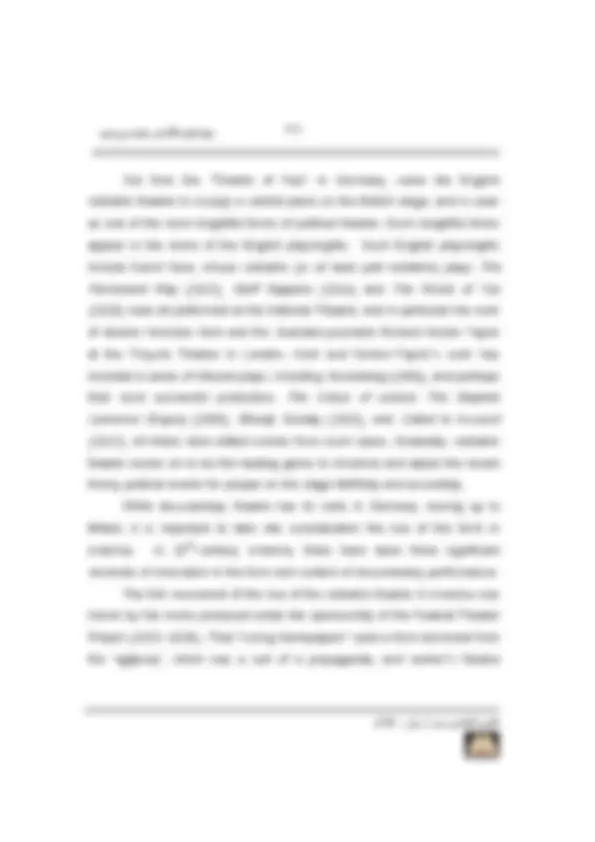
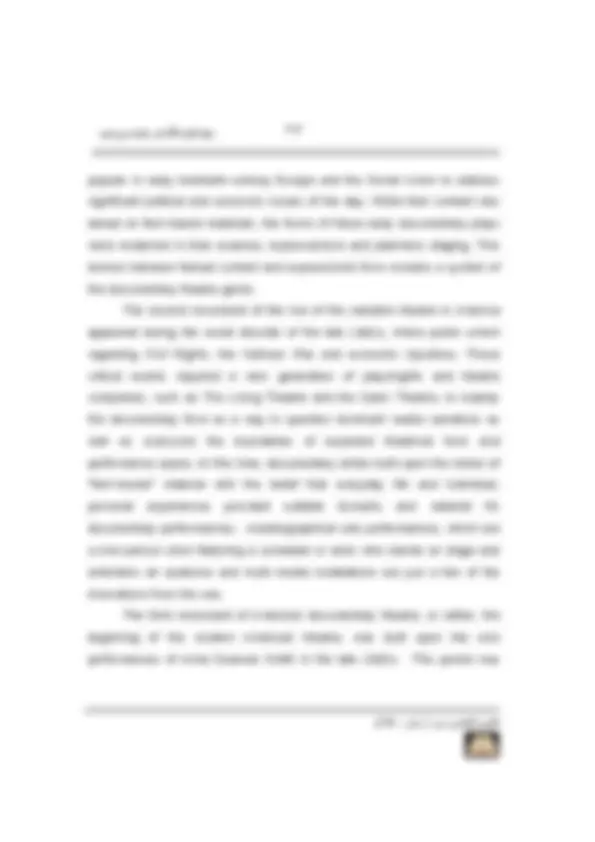
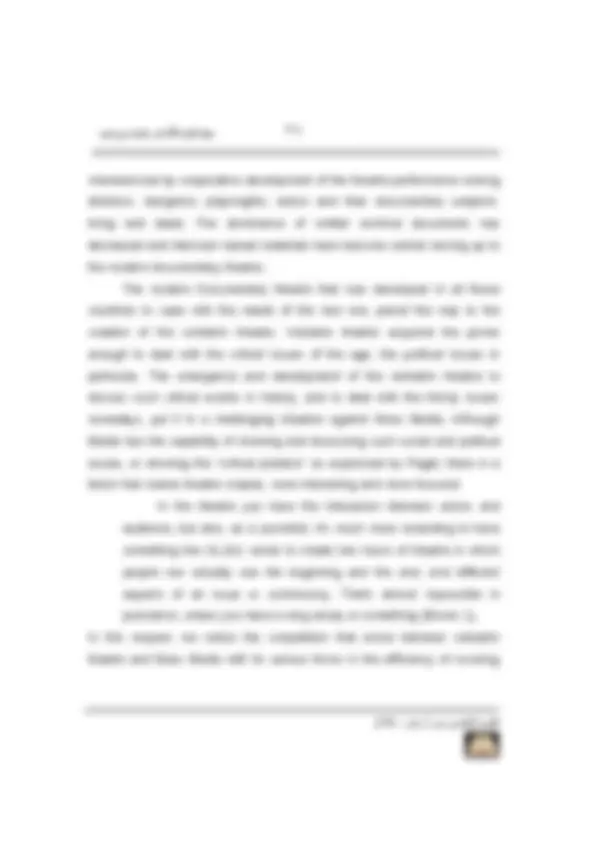
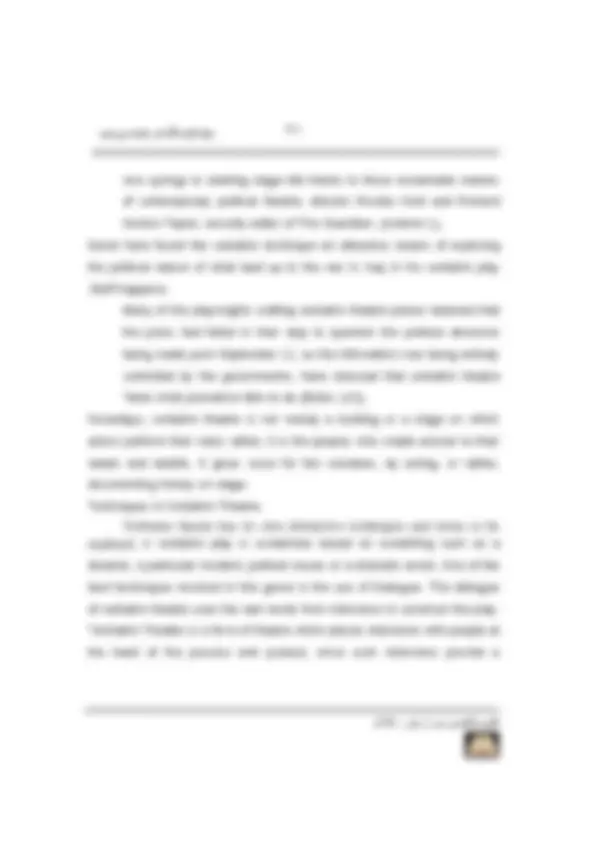
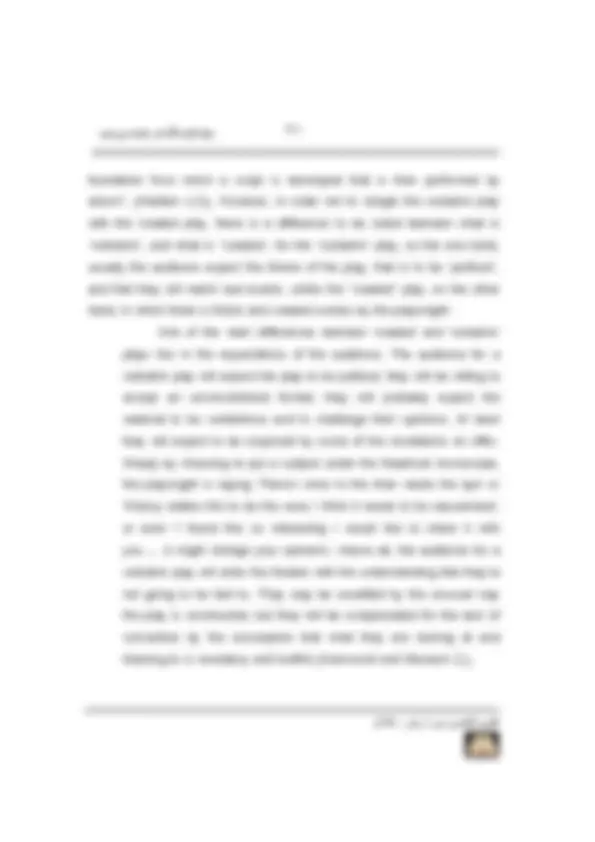
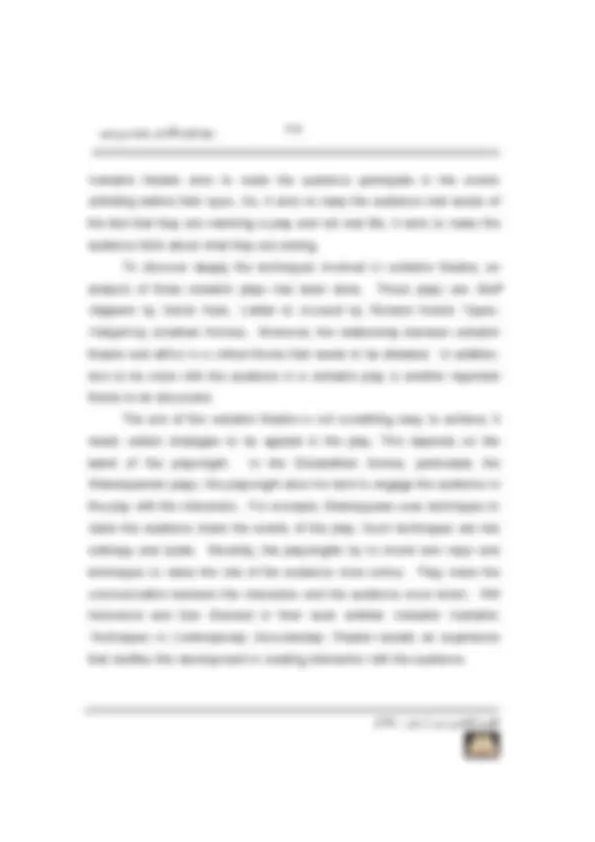
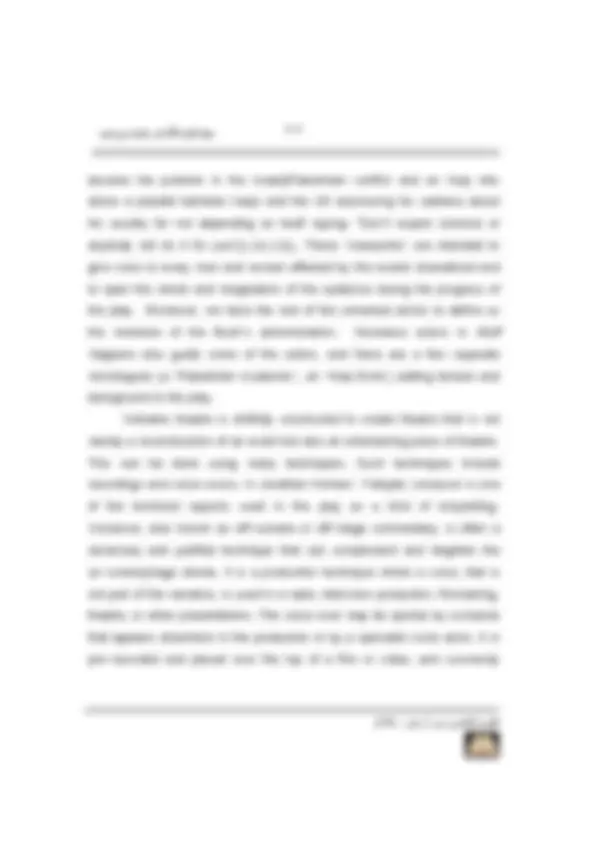
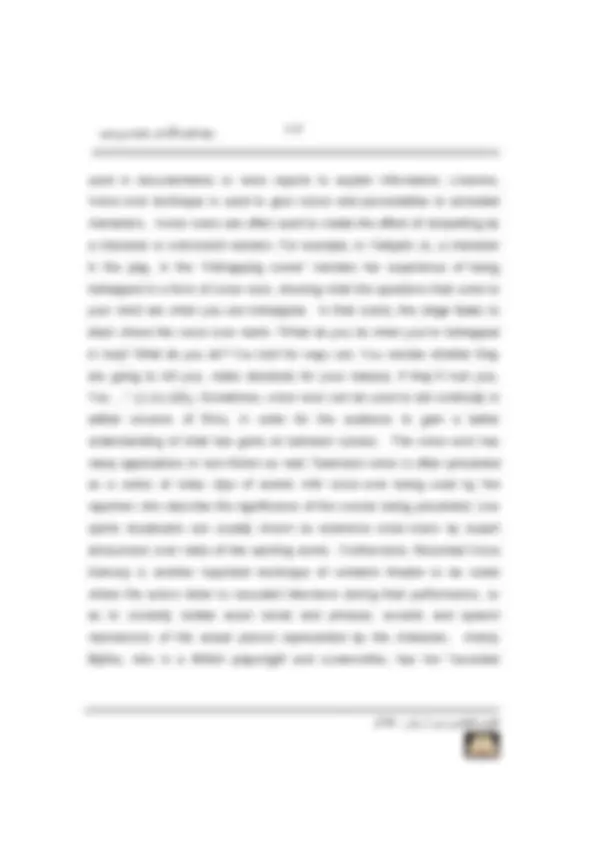
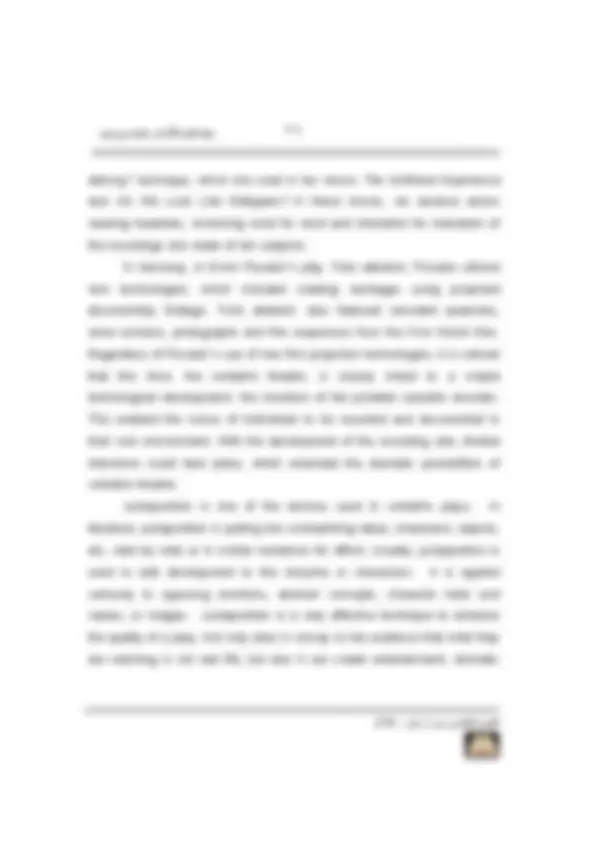
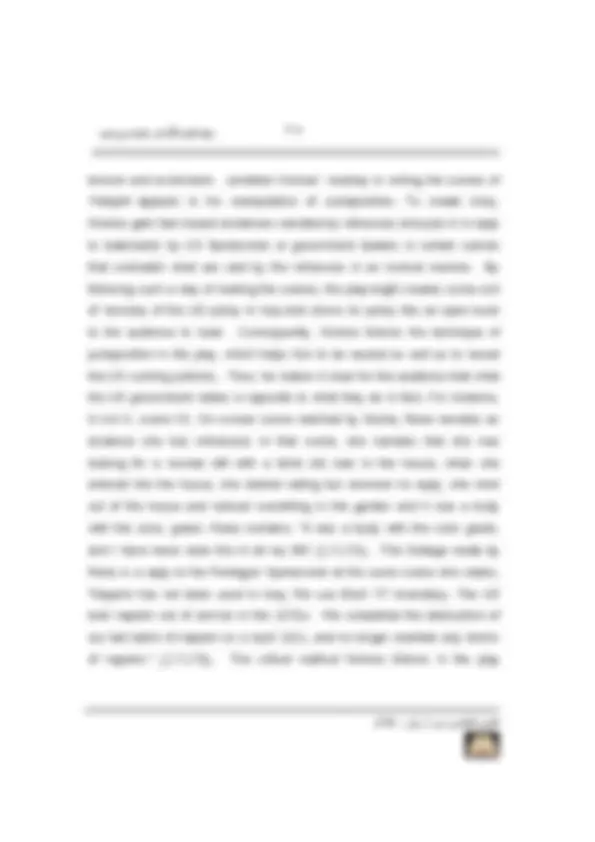
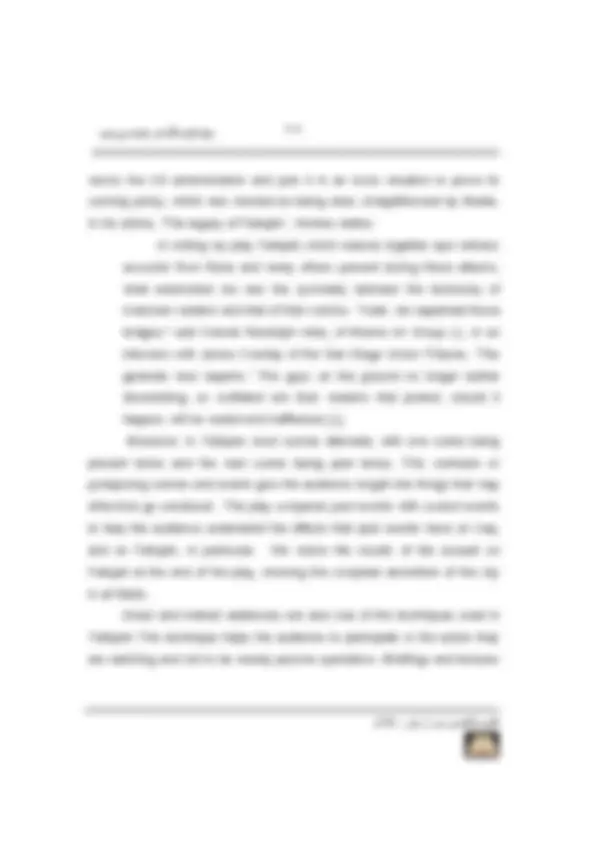
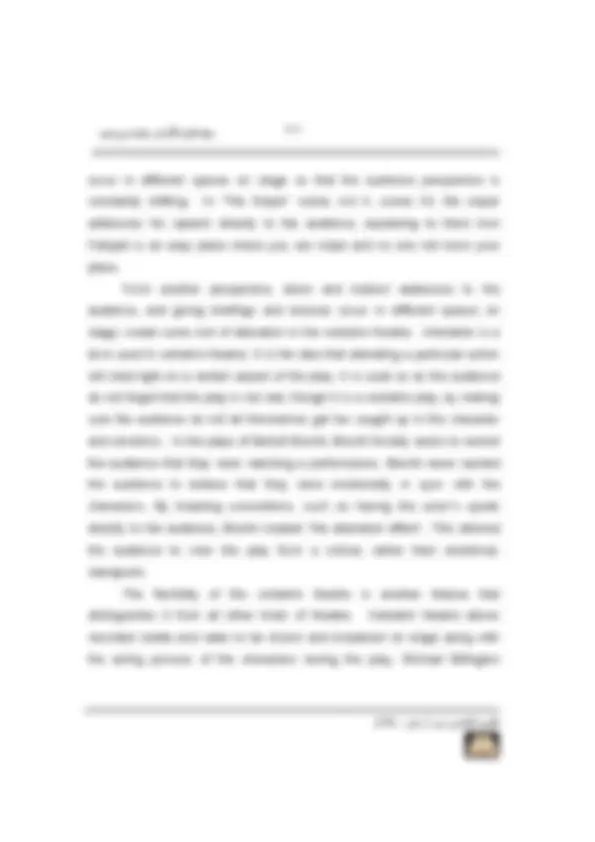
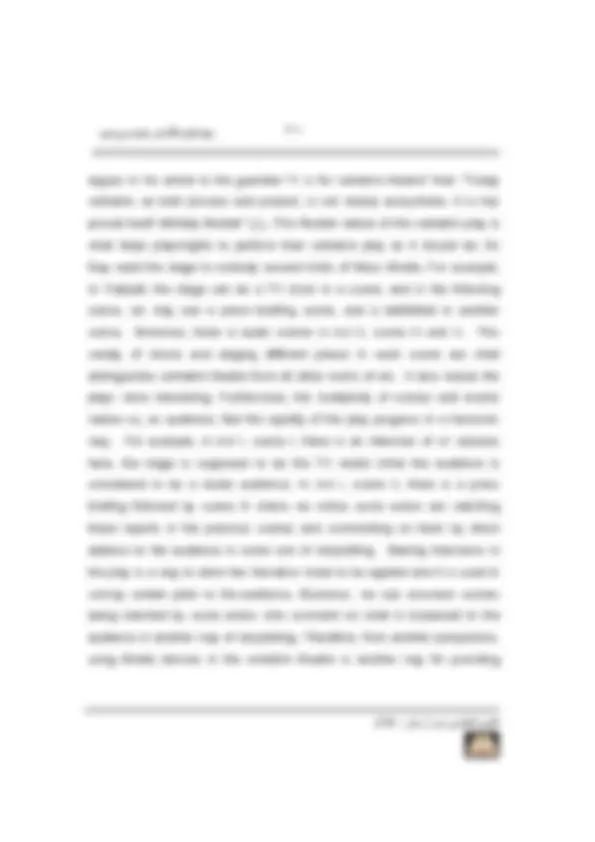
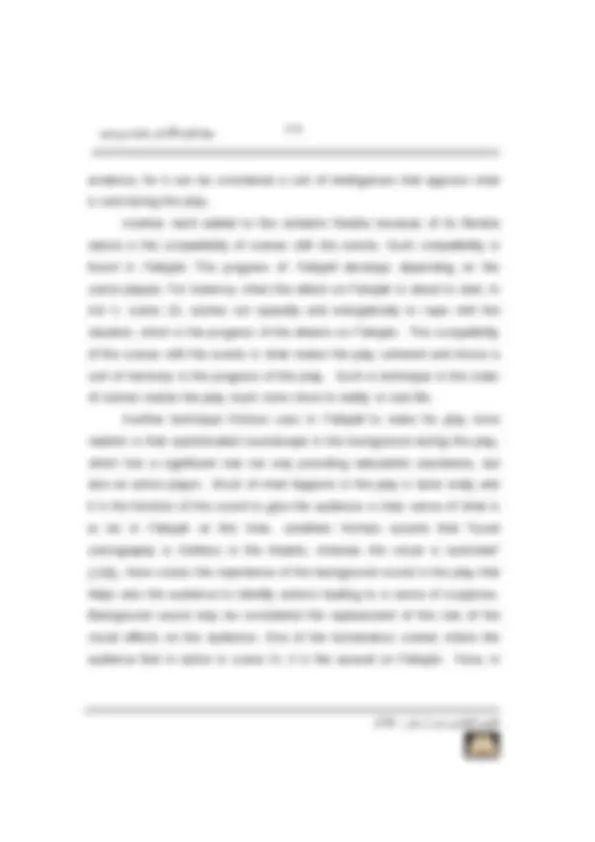
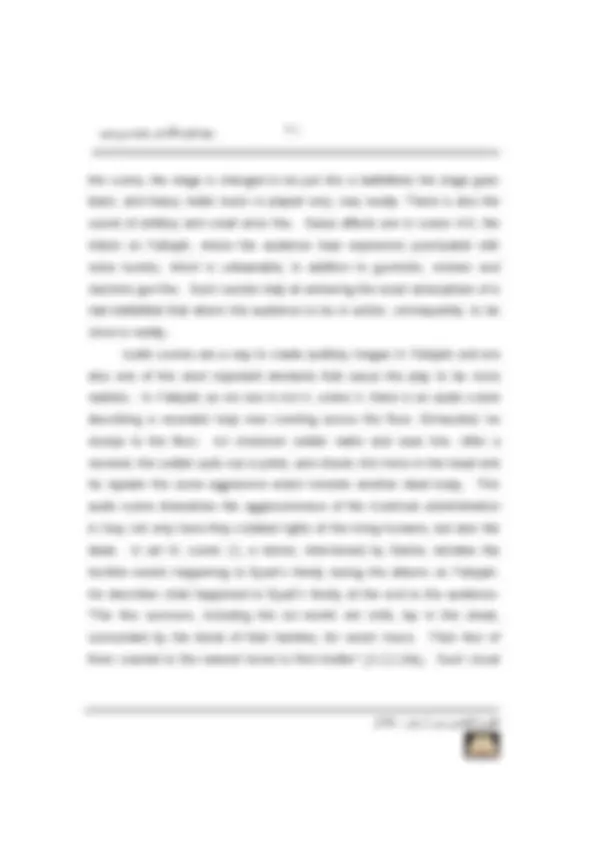
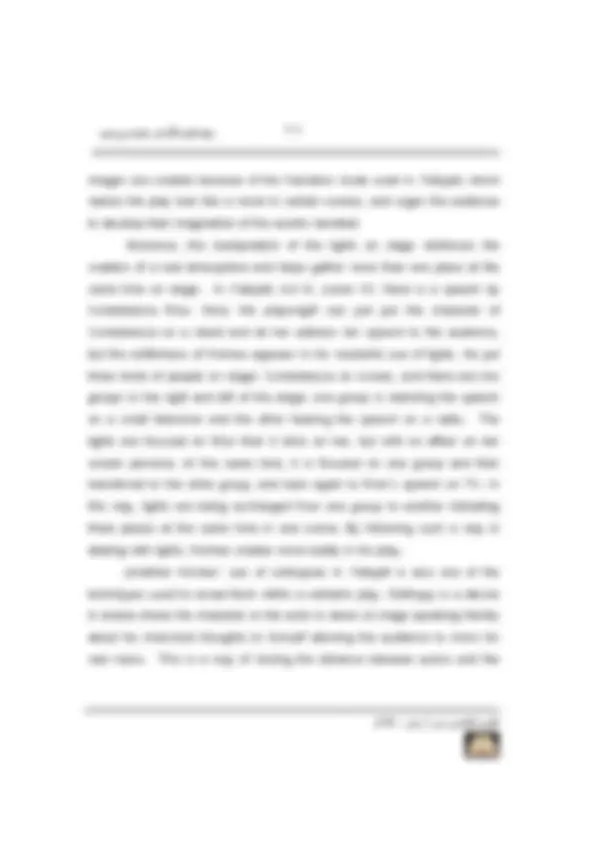
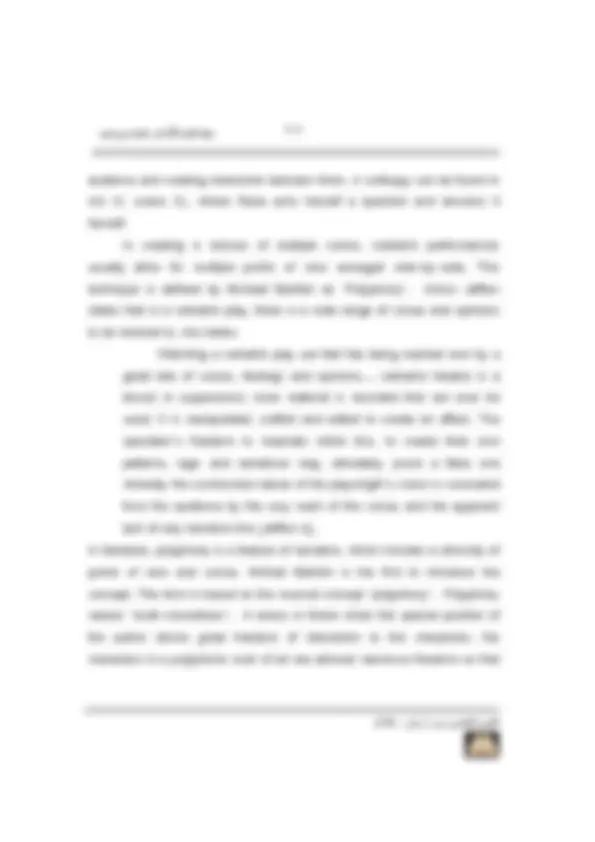
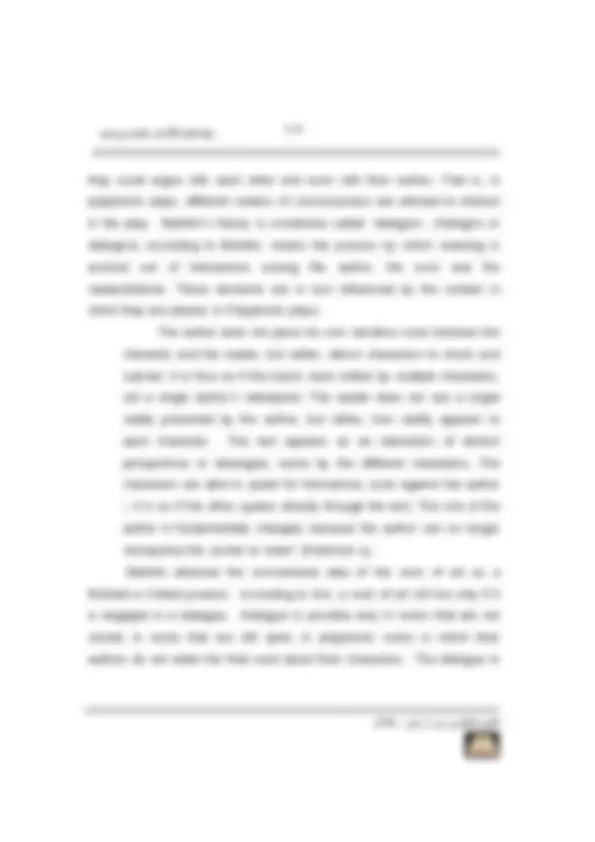
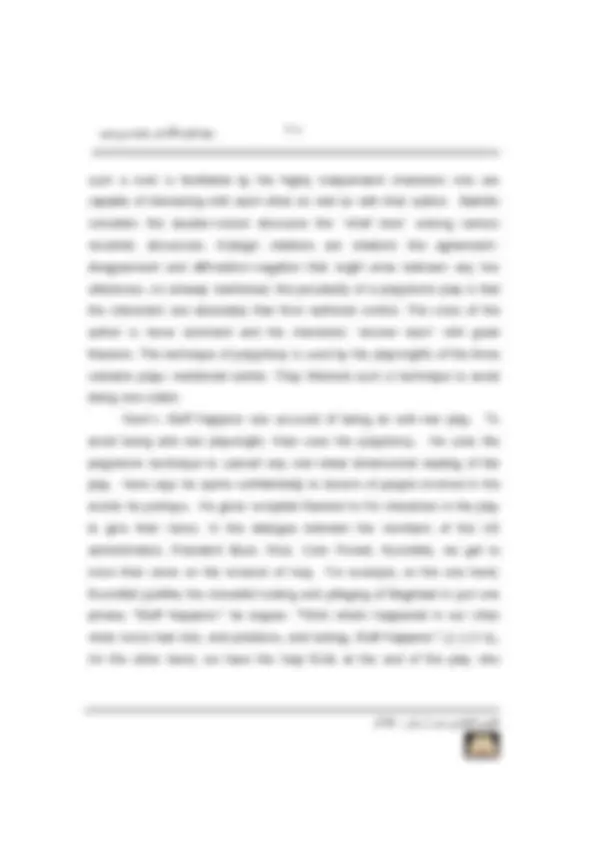
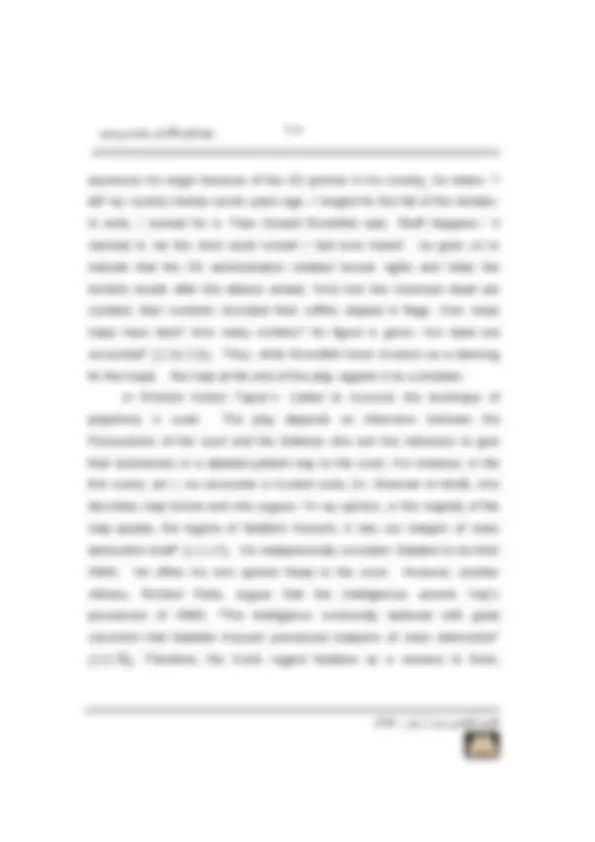
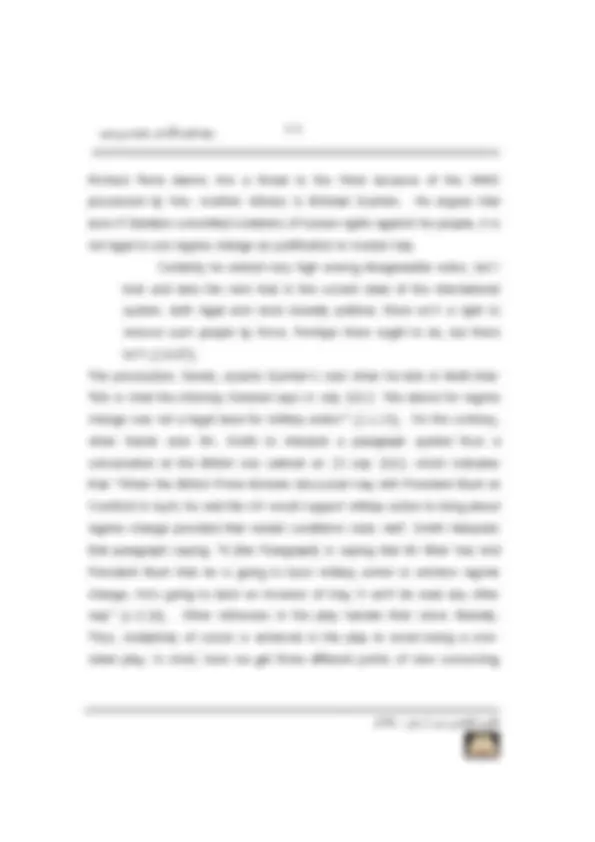
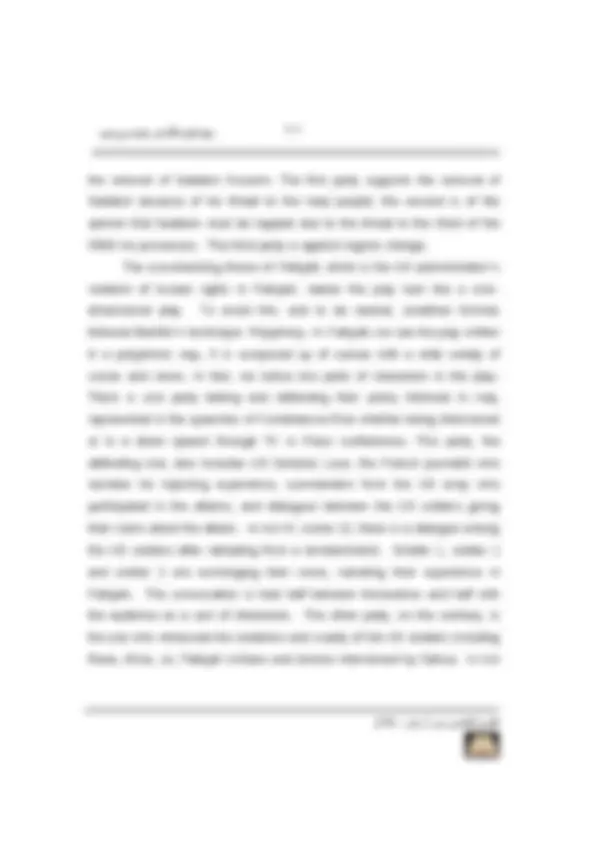
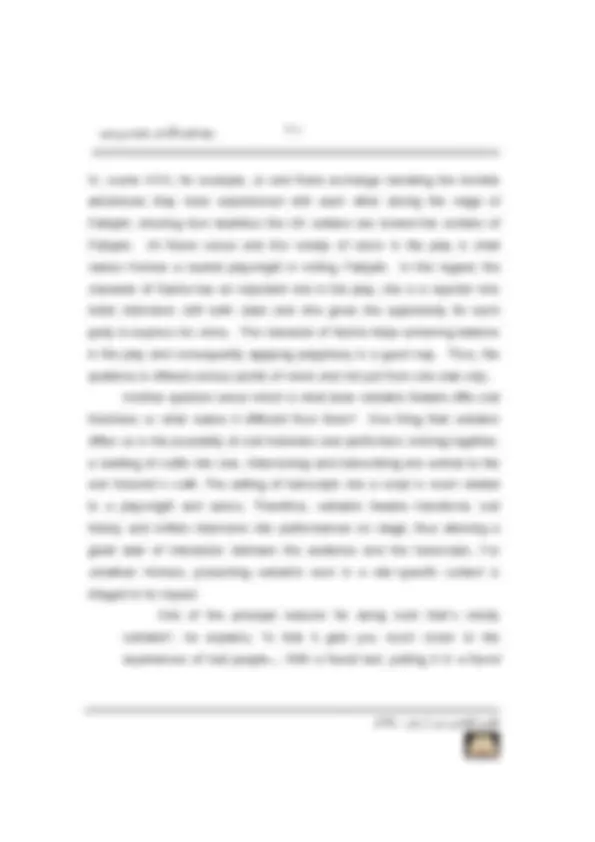
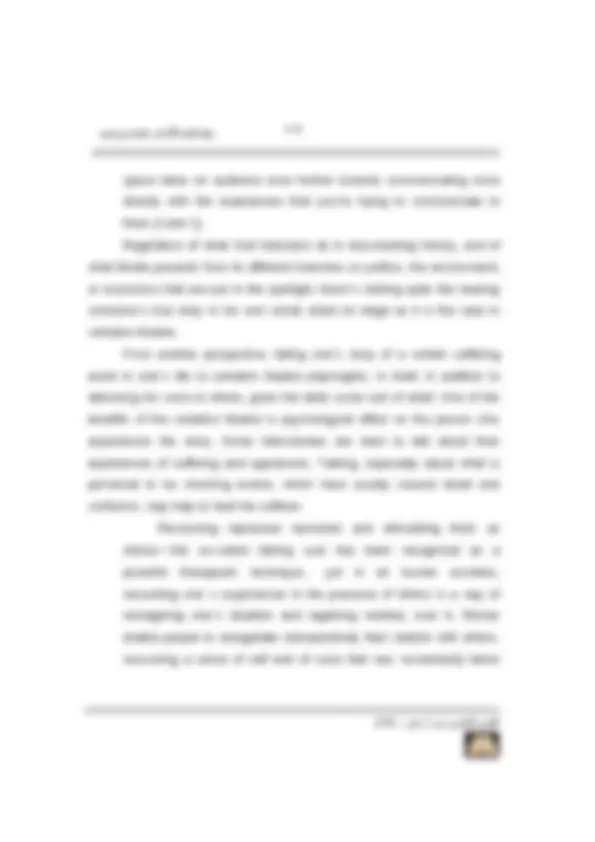
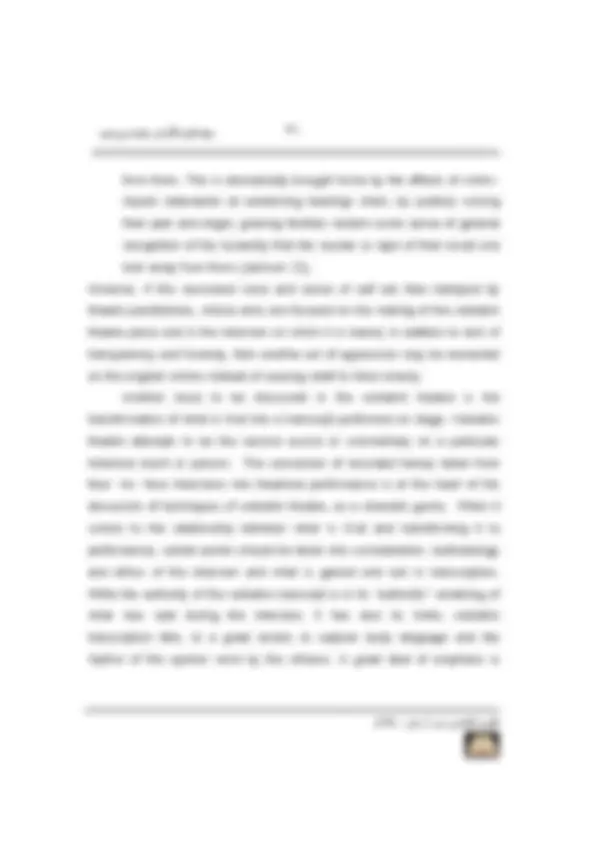
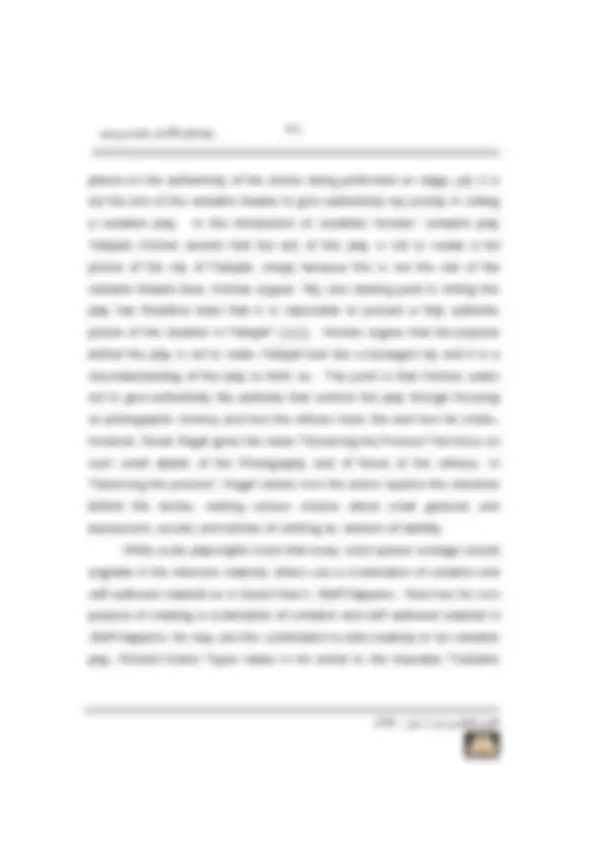
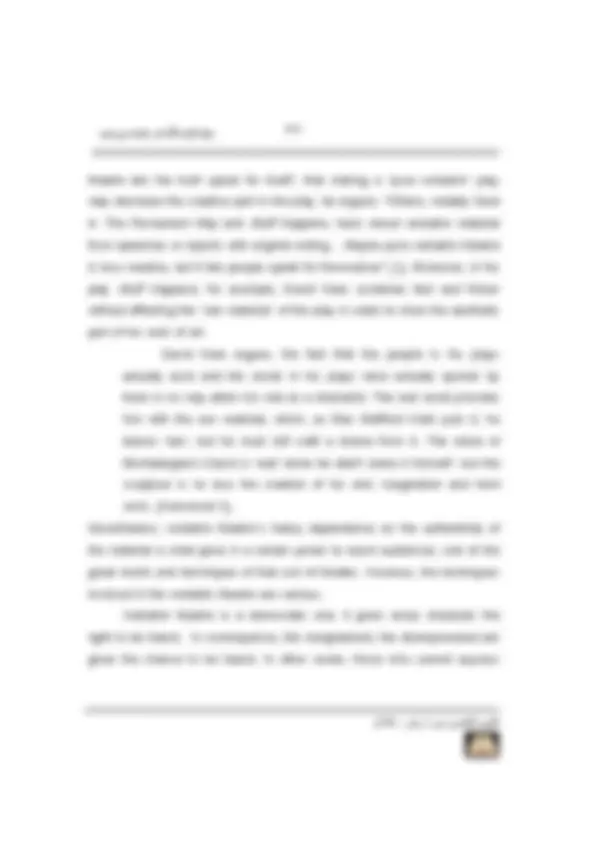
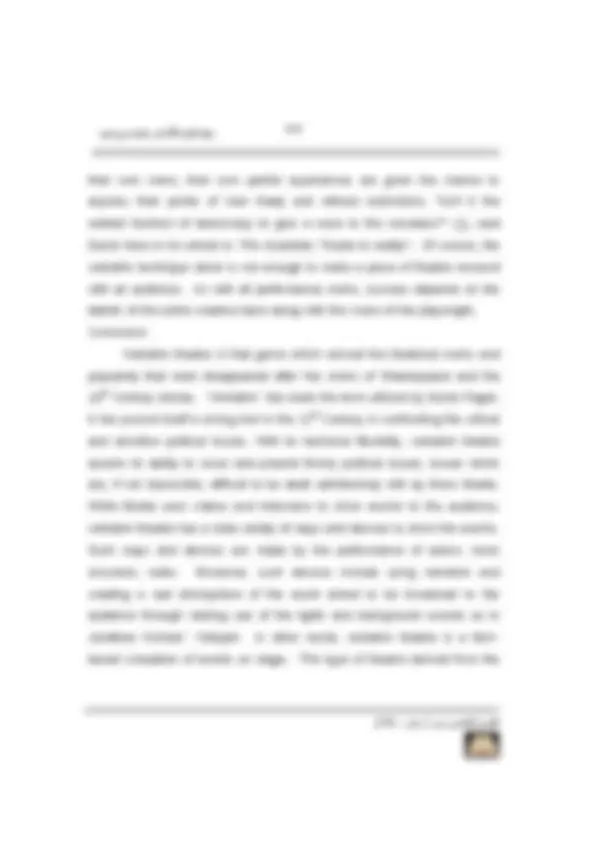
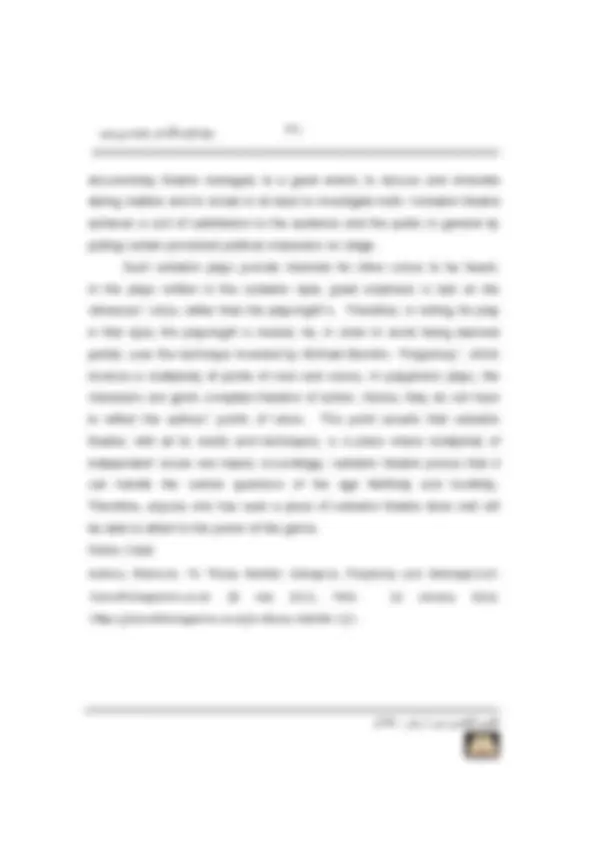
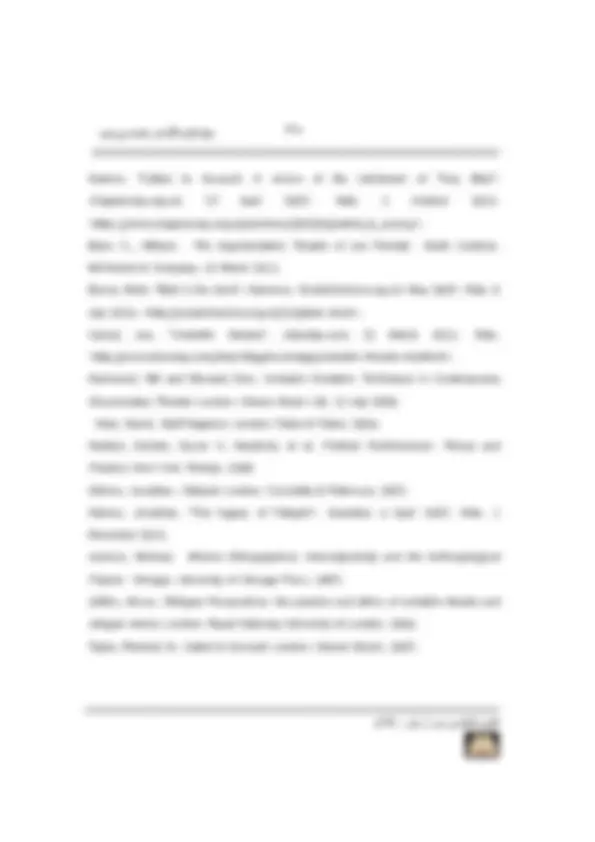


Study with the several resources on Docsity

Earn points by helping other students or get them with a premium plan


Prepare for your exams
Study with the several resources on Docsity

Earn points to download
Earn points by helping other students or get them with a premium plan
Community
Ask the community for help and clear up your study doubts
Discover the best universities in your country according to Docsity users
Free resources
Download our free guides on studying techniques, anxiety management strategies, and thesis advice from Docsity tutors
Autobiographical solo performances, which are a one-person show featuring a comedian or actor who stands on stage and entertains an audience and multi-media ...
Typology: Summaries
1 / 41

This page cannot be seen from the preview
Don't miss anything!


































ﺟﺎﻣﻌﺔ ﺑﻮرﺳﻌﻴﺪ ﻣﺠﻠﺔ ﻛﻠﻴﺔ اﻵداب ــــــــــــــــــــــــــــــــــــــــــــــــــــــ ــــــــــــــــــــــــــــــــــــــــــــــــــــــــــــــــــــــــــــــــــــــــــــــــــــــــــــــــــ
ـــــــــــــــــــــــــــــــــــــــ ــــــــــــــــــــــــــــــــــــــــــــــــــــــــــــــــــــــــــــــــــــــــــــــــــــــــــــــــــــــــــــــــــــ
٢٥٥
ﺟﺎﻣﻌﺔ ﺑﻮرﺳﻌﻴﺪ ﻣﺠﻠﺔ ﻛﻠﻴﺔ اﻵداب ــــــــــــــــــــــــــــــــــــــــــــــــــــــ ــــــــــــــــــــــــــــــــــــــــــــــــــــــــــــــــــــــــــــــــــــــــــــــــــــــــــــــــــ
ـــــــــــــــــــــــــــــــــــــــ ــــــــــــــــــــــــــــــــــــــــــــــــــــــــــــــــــــــــــــــــــــــــــــــــــــــــــــــــــــــــــــــــــــ
٢٥٦
ﺟﺎﻣﻌﺔ ﺑﻮرﺳﻌﻴﺪ ﻣﺠﻠﺔ ﻛﻠﻴﺔ اﻵداب ــــــــــــــــــــــــــــــــــــــــــــــــــــــ ــــــــــــــــــــــــــــــــــــــــــــــــــــــــــــــــــــــــــــــــــــــــــــــــــــــــــــــــــ
ـــــــــــــــــــــــــــــــــــــــ ــــــــــــــــــــــــــــــــــــــــــــــــــــــــــــــــــــــــــــــــــــــــــــــــــــــــــــــــــــــــــــــــــــ
٢٥٨
Historically, Theatre has a crucial role, which is to expose the important events of its age. Thus, when studying a history of a certain era, theatre is the best tool to resort to in such a study. Theatre provides a full picture of this era’s cultural, political, social, moral and religious heritage, from this function, comes the importance of theatre. This fact is embodied by verbatim theatre, a new dramatic genre born out of documentary theatre. Verbatim theatre is a theatre necessitated by the need of the late 20th^ and early 21thcenturies for a dramatic form capable of dealing with the pains, sufferings and disappointments experienced by the people living during the two centuries. With journalism fettered by the most powerful country in the world, dramatists began to search for a new form with which to deal with the exigencies of the situation imposed by the States. The new form happened to be the verbatim, a form more frankly able than journalism to tackle such thorny issues. However, to trace the history and techniques of the new genre, there should be a historical study of the origin, from which the verbatim theatre came. This origin comes to be the Documentary Theatre. Documentary Theatre has its deep roots in history that need to be investigated. In all eras, theatre has a role to show the customs and traditions of nations. Such a role, led to the creation of a genre utilized to deal with recent historical, cultural, and political events to be documented on stage. Later on, with the spread of this genre of theatre all over the world, it
ﺟﺎﻣﻌﺔ ﺑﻮرﺳﻌﻴﺪ ﻣﺠﻠﺔ ﻛﻠﻴﺔ اﻵداب ــــــــــــــــــــــــــــــــــــــــــــــــــــــ ــــــــــــــــــــــــــــــــــــــــــــــــــــــــــــــــــــــــــــــــــــــــــــــــــــــــــــــــــ
ـــــــــــــــــــــــــــــــــــــــ ــــــــــــــــــــــــــــــــــــــــــــــــــــــــــــــــــــــــــــــــــــــــــــــــــــــــــــــــــــــــــــــــــــ
٢٥٩
started to be developed according to the age it deals with in order to satisfy its needs. Accordingly, the genre has been given several unique names. Nowadays, with the development of events all over the world, particularly on the political side, analyzing and discussing these political matters become something urgent. As a result, Media started to shed the light on the political issues that arose in 20th^ and early 21st^ Century. However, with the appearance of what is called nowadays the ‘Power States’, Media became captivated by these States, which affected and limited its abilities of covering the political events. With the development of devices to document events, such as newspaper reports, radio, and the invention of television, and later on, face to face interviews, theatre started to utilize these devices to enable it to cope with the modern political events. This genre has been given the name “Verbatim”. Verbatim theatre has the devices Media use in covering events and the power and independency that media lacks because of the manipulation of Power States over it when dealing with the thorny political events. Soans argued for the importance of verbatim theatre, as a sort of arts, she states: “The arts are more than mere entertainment. In my view they should be the vessel which houses the conscience of a nation; they should ask the difficult questions others would rather leave unasked” (Boles 158). In the last two centuries, theatre playwrights and producers in Europe start to resort to documentary performances to confront the new socio- political crises. This kind of theatre, which depends on documented
ﺟﺎﻣﻌﺔ ﺑﻮرﺳﻌﻴﺪ ﻣﺠﻠﺔ ﻛﻠﻴﺔ اﻵداب ــــــــــــــــــــــــــــــــــــــــــــــــــــــ ــــــــــــــــــــــــــــــــــــــــــــــــــــــــــــــــــــــــــــــــــــــــــــــــــــــــــــــــــ
ـــــــــــــــــــــــــــــــــــــــ ــــــــــــــــــــــــــــــــــــــــــــــــــــــــــــــــــــــــــــــــــــــــــــــــــــــــــــــــــــــــــــــــــــ
٢٦١
where documentary theatre is found such as Poland, South Africa, Russia, etc. Documentary Theatre, also called ‘Theatre of Fact’, is a German dramatic movement that arose during the early 1960s, associated primarily with Rolf Hochhuth, Peter Weiss, and Heinar Kipphardt. Their political plays examined recent historical events, often through official documents and court records. In its modern form, documentary theatre was pioneered by two famous German authors and directors: Bertolt Brecht and Erwin Piscator in the 1920s. On the one hand, Brecht was a German poet, playwright, and a theatre practitioner of the 20th century, and he made contributions to dramaturgy and theatrical production. On the other hand, Piscator was an influential 20th-century German theatre director who was considered one of modernism's most important theatre practitioners. In Brecht’s and Piscator’s plays, they focus on issues of social conflict, class tensions and power structures. Essentially derived from Brecht and Piscator's Epic Theatre, Piscator developed his own 'Living Newspaper' in the 1930s. Erwin
acknowledged as the first stage documentary. To be more precise, there are three major periods of German documentary theatre: the emerging genre in the 1920s with the theatre of Erwin Piscator; the documentary drama in the 1960s; and, beginning in the late 1990s, the new forms of alternative and independent theatre that are highly experiential and question the conception and performance of historical discourses.
ﺟﺎﻣﻌﺔ ﺑﻮرﺳﻌﻴﺪ ﻣﺠﻠﺔ ﻛﻠﻴﺔ اﻵداب ــــــــــــــــــــــــــــــــــــــــــــــــــــــ ــــــــــــــــــــــــــــــــــــــــــــــــــــــــــــــــــــــــــــــــــــــــــــــــــــــــــــــــــ
ـــــــــــــــــــــــــــــــــــــــ ــــــــــــــــــــــــــــــــــــــــــــــــــــــــــــــــــــــــــــــــــــــــــــــــــــــــــــــــــــــــــــــــــــ
٢٦٢
Out from the ‘Theatre of Fact’ in Germany, came the English verbatim theatre to occupy a central place on the British stage, and is seen as one of the most insightful forms of political theatre. Such insightful forms appear in the works of the English playwrights. Such English playwrights
(2009) were all performed at the National Theatre; and in particular the work
at the Tricycle Theatre in London. Kent and Norton-Taylor’s work has
(2007). All these were edited scenes from court cases. Gradually, verbatim theatre moves on to be the leading genre to chronicle and depict the recent thorny political events for people on the stage faithfully and accurately. While documentary theatre has its roots in Germany moving up to Britain, it is important to take into consideration the rise of this form in America. In 20 th-century America, there have been three significant moments of innovation in the form and content of documentary performance: The first movement of the rise of the verbatim theatre in America was known by the works produced under the sponsorship of the Federal Theater Project (1935-1939). Their “Living Newspapers” used a form borrowed from the ‘agitprop’, which was a sort of a propaganda, and worker’s theatre
ﺟﺎﻣﻌﺔ ﺑﻮرﺳﻌﻴﺪ ﻣﺠﻠﺔ ﻛﻠﻴﺔ اﻵداب ــــــــــــــــــــــــــــــــــــــــــــــــــــــ ــــــــــــــــــــــــــــــــــــــــــــــــــــــــــــــــــــــــــــــــــــــــــــــــــــــــــــــــــ
ـــــــــــــــــــــــــــــــــــــــ ــــــــــــــــــــــــــــــــــــــــــــــــــــــــــــــــــــــــــــــــــــــــــــــــــــــــــــــــــــــــــــــــــــ
٢٦٤
characterized by cooperative development of the theatre performance among directors, designers, playwrights, actors and their documentary subjects: living and dead. The dominance of written archival documents has decreased and interview-based materials have become central moving up to the modern documentary theatre. The modern Documentary theatre that was developed in all these countries to cope with the needs of the new era, paved the way to the creation of the verbatim theatre. Verbatim theatre acquired the power enough to deal with the critical issues of the age, the political issues in particular. The emergence and development of the verbatim theatre to discuss such critical events in history, and to deal with the thorny issues nowadays, put it in a challenging situation against Mass Media. Although Media has the capability of showing and discussing such social and political issues, or showing the ‘critical problem’ as expressed by Paget, there is a factor that makes theatre simpler, more interesting and more focused: In the theatre you have the interaction between actors and audience, but also, as a journalist, it's much more rewarding to have something like 30,000 words to create two hours of theatre in which people can actually see the beginning and the end, and different aspects of an issue or controversy. That's almost impossible in journalism, unless you have a long essay or something (Brown 2). In this respect, we notice the competition that arose between verbatim theatre and Mass Media with its various forms in the efficiency of covering
ﺟﺎﻣﻌﺔ ﺑﻮرﺳﻌﻴﺪ ﻣﺠﻠﺔ ﻛﻠﻴﺔ اﻵداب ــــــــــــــــــــــــــــــــــــــــــــــــــــــ ــــــــــــــــــــــــــــــــــــــــــــــــــــــــــــــــــــــــــــــــــــــــــــــــــــــــــــــــــ
ـــــــــــــــــــــــــــــــــــــــ ــــــــــــــــــــــــــــــــــــــــــــــــــــــــــــــــــــــــــــــــــــــــــــــــــــــــــــــــــــــــــــــــــــ
٢٦٥
the critical events in the 21rst Century, and in particular, on the political side. The controversy that surfaced between theatre and Media on the covering of the thorny political events is a matter of great importance. The political potential of verbatim is a type of new public sphere in which issues and information that may otherwise be forced underground by big Media interests, for example, can be resurfaced. In an interview with Mark Brown
and Richard Norton Taylor, Brown states in his article “Blair in the dock”: Both director and writer believe that the theatre is the best possible forum for debates about important political disputes like the occupation of Iraq. ‘Theatre is a great medium for presenting contemporary issues that aren't, perhaps cannot be, adequately or properly articulated in newspapers, television or radio,’ says Norton- Taylor. (2). Brown continues to argue in his article adding: For Kent, as a dramatist, there is a world of difference between presenting the arguments around a major political issue on television and doing the same thing at the theatre. ‘In the theatre you have quite a lot of time to wrestle with an issue, whereas television programmes are fast and punchy. Television programmes can't be a slow burn in the way that theatre productions can: they can't accumulate ideas and issues; they have to go immediately for the
ﺟﺎﻣﻌﺔ ﺑﻮرﺳﻌﻴﺪ ﻣﺠﻠﺔ ﻛﻠﻴﺔ اﻵداب ــــــــــــــــــــــــــــــــــــــــــــــــــــــ ــــــــــــــــــــــــــــــــــــــــــــــــــــــــــــــــــــــــــــــــــــــــــــــــــــــــــــــــــ
ـــــــــــــــــــــــــــــــــــــــ ــــــــــــــــــــــــــــــــــــــــــــــــــــــــــــــــــــــــــــــــــــــــــــــــــــــــــــــــــــــــــــــــــــ
٢٦٧
now springs to startling stage-life thanks to those remarkable makers of contemporary political theatre, director Nicolas Kent and Richard Norton-Taylor, security editor of The Guardian. (Andrew 1). David Hare found the verbatim technique an attractive means of exploring the political nature of what lead up to the war in Iraq in his verbatim play
Many of the playwrights crafting verbatim theatre pieces believed that the press had failed in their duty to question the political decisions being made post-September 11, as the information was being entirely controlled by the governments. Hare stressed that verbatim theatre “does what journalism fails to do (Boles 143). Nowadays, verbatim theatre is not merely a building or a stage on which actors perform their roles; rather, it is the people, who create answer to their needs and beliefs. It gives voice for the voiceless, by acting, or rather, documenting history on stage. Techniques in Verbatim Theatre: Verbatim theatre has its own distinctive techniques and terms to be explored. A verbatim play is sometimes based on something such as a disaster, a particular incident, political issues or a dramatic event. One of the best techniques involved in this genre is the use of Dialogue. The dialogue of verbatim theatre uses the real words from interviews to construct the play: “Verbatim Theatre is a form of theatre which places interviews with people at the heart of the process and product, since such interviews provide a
ﺟﺎﻣﻌﺔ ﺑﻮرﺳﻌﻴﺪ ﻣﺠﻠﺔ ﻛﻠﻴﺔ اﻵداب ــــــــــــــــــــــــــــــــــــــــــــــــــــــ ــــــــــــــــــــــــــــــــــــــــــــــــــــــــــــــــــــــــــــــــــــــــــــــــــــــــــــــــــ
ـــــــــــــــــــــــــــــــــــــــ ــــــــــــــــــــــــــــــــــــــــــــــــــــــــــــــــــــــــــــــــــــــــــــــــــــــــــــــــــــــــــــــــــــ
٢٦٨
foundation from which a script is developed that is then performed by actors”. (Heddon 115). However, in order not to mingle the verbatim play with the created play, there is a difference to be noted between what is ‘verbatim’, and what is ‘created’. for the ‘verbatim’ play, on the one hand, usually the audience expect the theme of the play; that is to be ‘political’, and that they will watch real events, unlike the ‘created’ play, on the other hand, in which there is fiction and created scenes by the playwright: One of the main differences between 'created' and 'verbatim' plays lies in the expectations of the audience. The audience for a verbatim play will expect the play to be political; they will be willing to accept an unconventional format; they will probably expect the material to be contentious and to challenge their opinions. At least they will expect to be surprised by some of the revelations on offer. Simply by choosing to put a subject under the theatrical microscope, the playwright is saying 'There's more to this than meets the eye' or 'History relates this to be the case; I think it needs to be reexamined', or even 'I found this so interesting I would like to share it with you .. .it might change your opinions'. Above all, the audience for a verbatim play will enter the theatre with the understanding that they're not going to be lied to. They may be unsettled by the unusual way the play is constructed, but they will be compensated for the lack of convention by the assumption that what they are looking at and listening to is revelatory and truthful (Hammond and Steward 11).
ﺟﺎﻣﻌﺔ ﺑﻮرﺳﻌﻴﺪ ﻣﺠﻠﺔ ﻛﻠﻴﺔ اﻵداب ــــــــــــــــــــــــــــــــــــــــــــــــــــــ ــــــــــــــــــــــــــــــــــــــــــــــــــــــــــــــــــــــــــــــــــــــــــــــــــــــــــــــــــ
ـــــــــــــــــــــــــــــــــــــــ ــــــــــــــــــــــــــــــــــــــــــــــــــــــــــــــــــــــــــــــــــــــــــــــــــــــــــــــــــــــــــــــــــــ
٢٧٠
Suppose I went to interview Mo Mowlam. She talks to me; I write down her words, and then edit them into a speech, or in some cases into dialogue between her and her husband. We then cast June Watson in the role. She sits on a chair on stage and talks to an audience, just as the original Mo Mowlam talked to me. By this process, the audience have become me, or whomever I happened to be with when I conducted the interview, and the Mo Mowlam on stage talks to the audience on a purely personal and confidential level. Every member of that audience begins to feel, ‘this woman is sharing the intimate details of her life with me ... her hopes, her regrets, her dilemmas, her innermost thoughts … She's speaking off the record with a frankness that she could never show in her public life ... She even reveals her penchant for broken biscuits .’ Transferring a deeply personal conversation onto to the stage in this way confers a responsibility on the audience - a responsibility which I think they enjoy - and this partially accounts for the increased intensity of their listening. Further encouraging the audience's involvement must be the care they develop for the characters. How many times after a show have I heard people say, 'I didn't enjoy it very much; I didn't care for any of the characters'? The chief reason for this failure is that the characters seem somehow artificial and therefore difficult to relate to. Artificiality is a charge that cannot be raised against the verbatim
ﺟﺎﻣﻌﺔ ﺑﻮرﺳﻌﻴﺪ ﻣﺠﻠﺔ ﻛﻠﻴﺔ اﻵداب ــــــــــــــــــــــــــــــــــــــــــــــــــــــ ــــــــــــــــــــــــــــــــــــــــــــــــــــــــــــــــــــــــــــــــــــــــــــــــــــــــــــــــــ
ـــــــــــــــــــــــــــــــــــــــ ــــــــــــــــــــــــــــــــــــــــــــــــــــــــــــــــــــــــــــــــــــــــــــــــــــــــــــــــــــــــــــــــــــ
٢٧١
playwright unless he or she is a complete charlatan. Actually, when the bricks and mortar of a play are real conversations, people use such idiosyncratic and bizarre language that it is immediately recognisable as lacking in artifice (13). Verbatim theatre playwrights seek to create real atmosphere in their plays as well as to create intimacy between the audience and the events of
of the Bush administration presenting it to the audience as if it were an open book. He uses certain techniques that help create such an atmosphere. A case in point is the use of the dialogue interweaved with the monologue. David Hare intermingles between scenes that depend on dialogue to show us the veil Bush’s administration members wear when they talk to people and follow these scenes with one depending on monologue as in Act I, scenes 4-5, where there is a meeting of Bush’s administration to discuss the issues of the middle east, and following that scene by a monologue of an angry journalist criticizing their policies. Such scenes helps uncover their hidden intentions and shows how contradict this administration are between themselves. The angry journalist summarizes their promises for their claim to achieve democracy asking: “what is the word for those who claim to love democracy…?” (1.5.16). This is a feature of the play made by David Hare, which is to create a series of monologues by various anonymous characters such as an American professor who compellingly argues the case for war, a Palestinian student who wonders how it came to pass that the victims
ﺟﺎﻣﻌﺔ ﺑﻮرﺳﻌﻴﺪ ﻣﺠﻠﺔ ﻛﻠﻴﺔ اﻵداب ــــــــــــــــــــــــــــــــــــــــــــــــــــــ ــــــــــــــــــــــــــــــــــــــــــــــــــــــــــــــــــــــــــــــــــــــــــــــــــــــــــــــــــ
ـــــــــــــــــــــــــــــــــــــــ ــــــــــــــــــــــــــــــــــــــــــــــــــــــــــــــــــــــــــــــــــــــــــــــــــــــــــــــــــــــــــــــــــــ
٢٧٣
used in documentaries or news reports to explain information. Likewise, Voice-over technique is used to give voices and personalities to animated characters. Voice-overs are often used to create the effect of storytelling by
in the play, in the ‘Kidnapping scene’ narrates her experience of being kidnapped in a form of voice-over, showing what the questions that come to your mind are when you are kidnapped. In that scene, the stage fades to black where the voice-over starts: “What do you do when you’re kidnapped in Iraq? What do you do? You look for ways out. You wonder whether they are going to kill you, make demands for your release, if they’ll hurt you. You …” (2.14.180). Sometimes, voice-over can be used to aid continuity in edited versions of films, in order for the audience to gain a better understanding of what has gone on between scenes. The voice-over has many applications in non-fiction as well; Television news is often presented as a series of video clips of events with voice-over being used by the reporters who describe the significance of the scenes being presented. Live sports broadcasts are usually shown as extensive voice-overs by expert announcers over video of the sporting event. Furthermore, Recorded Voice Delivery is another important technique of verbatim theatre to be noted where the actors listen to recorded interviews during their performance, so as to correctly imitate exact words and phrases, accents and speech mannerisms of the actual person represented by the character. Alecky Blythe, who is a British playwright and screenwriter, has her “recorded
ﺟﺎﻣﻌﺔ ﺑﻮرﺳﻌﻴﺪ ﻣﺠﻠﺔ ﻛﻠﻴﺔ اﻵداب ــــــــــــــــــــــــــــــــــــــــــــــــــــــ ــــــــــــــــــــــــــــــــــــــــــــــــــــــــــــــــــــــــــــــــــــــــــــــــــــــــــــــــــ
ـــــــــــــــــــــــــــــــــــــــ ــــــــــــــــــــــــــــــــــــــــــــــــــــــــــــــــــــــــــــــــــــــــــــــــــــــــــــــــــــــــــــــــــــ
٢٧٤
wearing headsets, mimicking word for word and intonation for intonation of the recordings she made of her subjects.
new technologies, which included creating montages using projected documentary footage. Trotz alledem! also featured recorded speeches, news-extracts, photographs and film sequences from the First World War. Regardless of Piscator’s use of new film projection technologies, it is noticed that this form, the verbatim theatre, is closely linked to a simple technological development: the invention of the portable cassette recorder. This enabled the voices of individuals to be recorded and documented in their own environment. With the development of the recording sets, Mobile interviews could take place, which extended the dramatic possibilities of verbatim theatre. Juxtaposition is one of the devices used in verbatim plays. In literature, juxtaposition is putting two contradicting ideas, characters, objects, etc. side-by-side or in similar narratives for effect. Usually, juxtaposition is used to add development to the storyline or characters. It is applied variously to opposing emotions, abstract concepts, character traits and values, or images. Juxtaposition is a very effective technique to enhance the quality of a play. Not only does it convey to the audience that what they are watching is not real life, but also it can create entertainment, dramatic